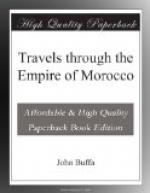This prince, the father of the present Emperor, was endowed with an intelligent mind, and possessed nothing of the barbarian. His political views, and excellent regulations, soon restored the order of things. He directed all his care to the welfare of his people, both at home and abroad; he concluded, and renewed, several advantageous commercial treaties, with England, France, Spain, Portugal, Sweden, Denmark, and Holland, with all of whom he maintained a good understanding till 1777; when, gained over by the courts of France and Spain, he broke the treaty with England, and refused to supply Gibraltar with fresh provisions. He appointed officers of the strictest integrity, and of moderate and resolute characters, to the government of his provinces; and the whole period of his reign was exempt from those horrible cruelties which had almost invariably disgraced the sceptres of his predecessors. He died at an advanced age, at Rabat, on the 11th of April 1790.
After the old Emperor’s death, the states of Barbary became convulsed by the civil discords, attended with great effusion of bloody occasioned by Sidi Mahomet’s numerous sons, who severally aspired to the crown. The contest was for a long time doubtful and bloody; but at length, Muley Yezid was proclaimed Emperor, by a powerful party. As the whole country was up in arms, he had to combat with many difficulties in establishing himself on the throne. He was no sooner confirmed in his power, than he exercised it with uncommon cruelty towards his captives. Under the idea of striking terror into the minds of his subjects, by the force of example, and deterring them from revolting again, he inflicted the most dreadful punishment on those who had opposed his authority; some he caused to be hung up by the feet, and suffered to perish for want of sustenance; others, to be crucified at the gates of the city; and several high priests, and officers of state, he deprived of the blessing of sight.
But his cruelty and inhumanity did not rest here. In the above proceedings he might possibly urge in palliation a regard to his personal safety, and the possession of a crown which he held by so precarious a tenure as the caprice of a multitude, who might wrest it from him with as little scruple as they had bestowed it, if not awed by some terrible example; but where shall we seek an excuse for his execrable barbarity to the poor Jews in his dominions, whom he ordered to be massacred, without distinction? The carnage was most horrible; and the property of this persecuted people was indiscriminately plundered by their rapacious murderers. Six young Jewesses, who ventured to intercede for their unhappy fathers and relations, were burned alive. My blood runs cold at the idea of such depravity; and I shrink, from the reflection that our own history will furnish us with annals, almost or fully as replete with horror as the one I am now relating.




